28 Jan 2025
AI Agents in Healthcare By AI App Development Company
Shaun Bell
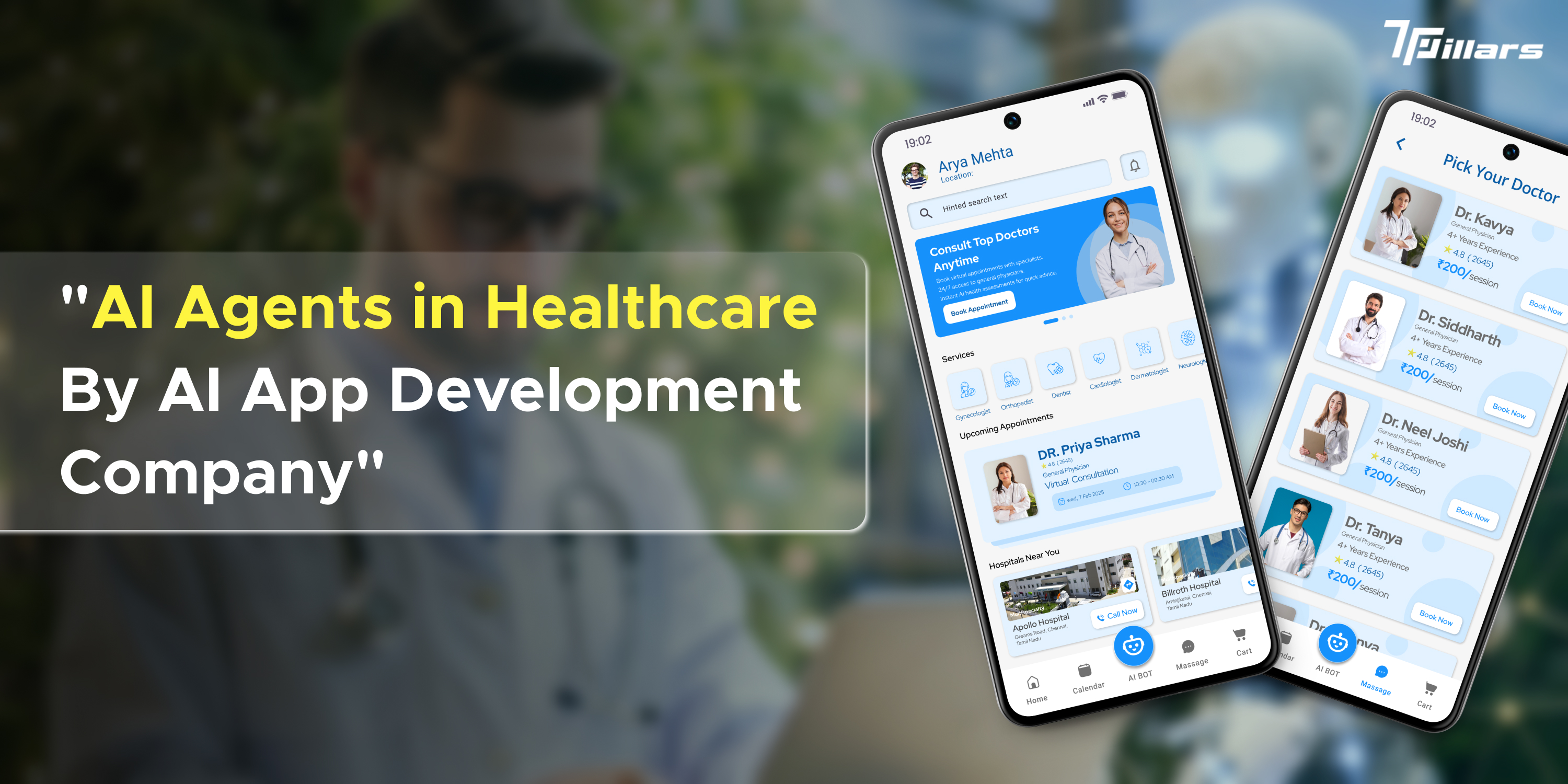
AI agents in healthcare mean a new, more innovative, more ef fective, and individualized approach to patient care. Artificial intelligence has become the driving force in transforming medical diagnostic, therapeutic, and patient management, resulting in improved health and proactive models. An AI app development company can help healthcare providers implement these advanced AI solutions to enhance patient care and operational efficiency further.
Artificially intelligent agents, which employ machine learning and natural language processing, have gradually been adopted to perform and automate complicated tasks in practice, including data analysis, clinical decision-making, and patient management. They can process vast amounts of medical information in real time to make sense of patterns, a process that might have evaded the human eye in practice.
AI Advantages for Decision-Making in Managing Health Problems
This helps clinicians make better and more timely decisions, allows for the earlier diagnosis of possible health problems, and, thus, more effective treatments. Among the fascinating trends is the use of AI in predictive analytics, where AI makes predictions about patient outcomes based on history. Using trends and predictions about the chances of developing specific conditions, an AI system helps healthcare providers step in when a patient’s condition worsens.
Furthermore, with the help of artificial and cognitive computing, virtual assistants/chatbots are improving patient satisfaction, from responding instantly to health issues inquiries to booking appointments and even giving health tips. Moving away from addressing concepts of efficiency and prediction, AI agents are also enabling developments in personalized medicine. Since AI systems need to know a patient’s genotype, daily habits, and past medical history, they can recommend therapies most likely to help a specific patient while avoiding those unlikely to be effective. An AI app development company can assist in creating and integrating these personalized AI-driven solutions into healthcare systems.
This existing technology is expected to revolutionize the healthcare system by being patient-centered, evidence-based, or wiser. Undoubtedly, AI agents will continue to increase their importance to healthcare solutions – for patients worldwide – far more intelligent, efficient, and humane care in the next few years.
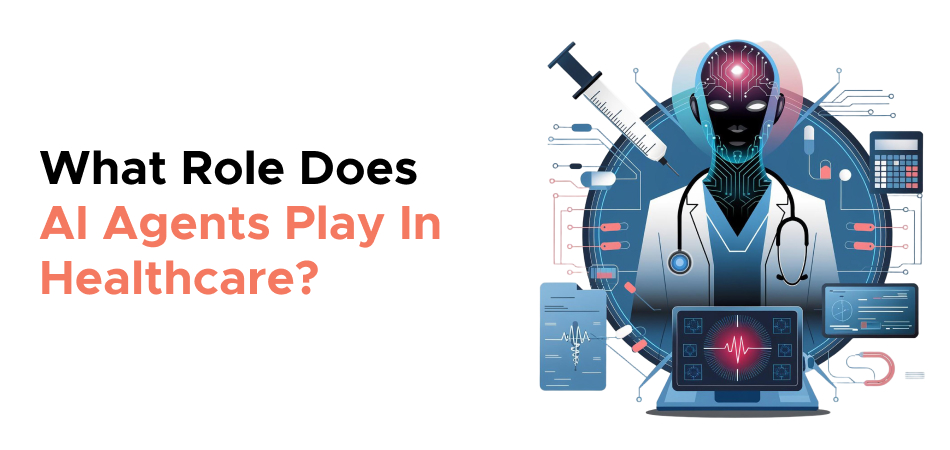
What are AI Agents in Healthcare?
What is the meaning of AI Agents in Healthcare?
Healthcare AI is a Computer Science application that uses Machine Learning, Data Analytics, and Natural Semantic Search. It is used in medical tasks and improves patients’ care and healthcare systems. These can include modeling individual human cognitive skills, including diagnosis, treatment, planning, patient relations, and administrative functionalities. Given their capacity to process a large and diverse number of cases per unit of time, AI agents are gaining popularity systematically in the healthcare industry.
AI and Its Application in the Healthcare System
AI can take on many organizational tasks and serve as decision support, analytic predictive, and patient relation. Integrating Artificial Intelligence in the clinical sector can equip the tools used in diagnosis with intelligence to interpret the results of medical images and patient history and make crucial decisions. AI can assist the radiologist in diagnosing X-rays or MRI, suggesting he did not notice. This saves the doctors time when diagnosing patients, making a better diagnosis and hence improving the lives of patients.
Routine tasks that used to consume much of healthcare providers’ time can also be comfortably assigned to AI agents. Such assistance may include appointment-making, treatment plan reminders, and likely health-related questions so that human practitioners can attend to other critical patient care tasks.
Improving Identification and Management
According to statistics, one of the most critical roles of AI agents in health care is to improve diagnostic decision-making and treatment. Because the AI agents can find correlations from data of histories of patients, results of clinical trials, and scientific articles, patients receive recommendations about the most efficient treatment. AI can also recognize patterns that may be invisible to the human doctor, suggesting more time-advanced threats to the person’s health.
For example, through interactions between a patient and an AI agent, the latter can adjust a treatment plan based on the patient’s genetic code, daily habits, and medical history. This paradigm, also called precision medicine, differs from general medicine as it caters to the client’s needs in a way that may enhance the chances of successful interventions.
Predictive Analytics and Preventive Care
AI agents also prove valuable assets in preventative health care through risk analysis. Using patient data and data collected by wearable technologies, one can define the chances of developing a particular disease, such as diabetes, heart disease, or cancer.
This enables healthcare providers to recommend early treatment by recommending a specific lifestyle change or treatment before a particular disease reaches its acute stage. In addition, advanced Predictive AI can anticipate future customer health concerns within the industry to minimize inefficient resource utilization.
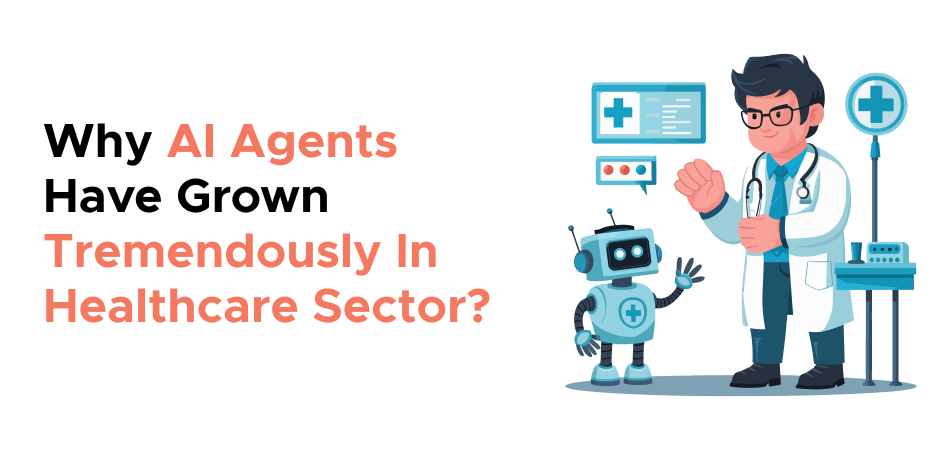
Key Stats On Growth Of AI Agents In Healthcare
AI is already active in supply chain management, marketing, and sales, and this element is rapidly expanding in healthcare because of the advances made in machine learning technologies, big data analysis, and the growing need for advanced and individualized products and services. Another source of information is By Grand View. The research AI market in healthcare stood at $14.6 billion in 2023 and is expected to grow at a CAGR of 37.7% to $196.5 billion in 2030.
Of the four areas identified above, interference by AI in diagnostics and treatment is the most significant. Accenture currently suggests that AI apps could yield $92B-$150B annually to the US healthcare sector by 2026, with most gains to come from streamlining offices, cutting fraud, and improving clinical practices. According to Frost & Sullivan, there is a potential to decrease diagnostic mistakes between 20–40% if clinical decision support systems are powered by artificial intelligence.
AI is also gradually appearing in patient engagement. By leveraging chatbots and telemedicine resources, virtual health assistants control at least 40% of patient contacts, with lesser waiting time and enhanced access.
These statistics illustrate how AI agents will drive significant changes in the future to improve healthcare efficiency, intelligence, and patient-centricity.
Core Functions of AI-Powered Healthcare Agents
Healthcare agents with the power of artificial intelligence are effectively changing the perception and reality of medicine as they integrate processes, outcomes, and patient satisfaction. These intelligent systems incorporated using machine learning, data analytics, and natural language processing can solve administrative tasks and complex diagnosis processes. Here are the core functions of AI agents in healthcare:
1. Diagnostic Support and Getting a Recommendation
AI agents are critical components in diagnostics because they incorporate information consisting of test results, essential images, and patient history records. With enhanced image recognition, these agents can help diagnose diseases like cancer, heart disease, and neurological diseases to a large extent. They help clinicians because they work interactively, reducing the likelihood of human mistakes and enhancing diagnosis time. These technologies also support the analysis of trends in big data that may be neglected in ordinary evaluations, enabling early diagnosis and treatment. An AI app development company can play a crucial role in developing these diagnostic solutions to improve accuracy and efficiency in healthcare.
2. Personalized Treatment Plans
The unique role of AI in health care is that it provides the capacity to offer patient-specific treatment. They apply data on penalties of previous health, endowment of genes, diet, and exercise regimens to recommend treatment. The AI assures patients receive appropriate specialized intercessions by incorporating the concept of individual differences. This makes the treatment effective and reduces the chances of side effects, making it a new healthcare model.
3. Predictive Analytics for Preventive Care
Healthcare assistants use predictive analytics in preventive care, which is essential in predictive analysis to detect possible risks to the general health of an individual. Through historical data analysis and capturing data of patients on admission and afterward, AI systems can prophesy diseases like diabetes, heart illnesses, and even strokes. Such models help healthcare givers prevent a worsening of ill health before it worsens, thus providing life and reducing spending.
4. Virtual Health Assistants
Intelligent Virtual Assistants are revolutionizing patient involvement and administrative tasks. Systems developed as chatbots or voice interfaces can address the patient’s questions, set up an appointment, and send a follow-up. AI agents automate these recurrent tasks so practitioners can attend to higher-level duties. Further, these assistants help patients stay knowledgeable about their journey and promote an enhanced health status. An AI app development company can assist in creating these virtual assistants to improve patient engagement and streamline healthcare processes.
5. Workflow Automation and Operational Efficiency
AI agents are changing ordinary work in care facilities. They are assistants with patients and substitutes for administrative clerks. AI application development service providers in Australia use artificial intelligence, specifically in an app related to automatic appointments, charges, and patient records.
This minimizes the paperwork done by healthcare practitioners, increases practical productivity, and eliminates costly mistakes born out of fatigue and stress. AI’s efficiency of various back-office functions means that healthcare institutions spend less time on administrative work and more on their core—looking after patients.
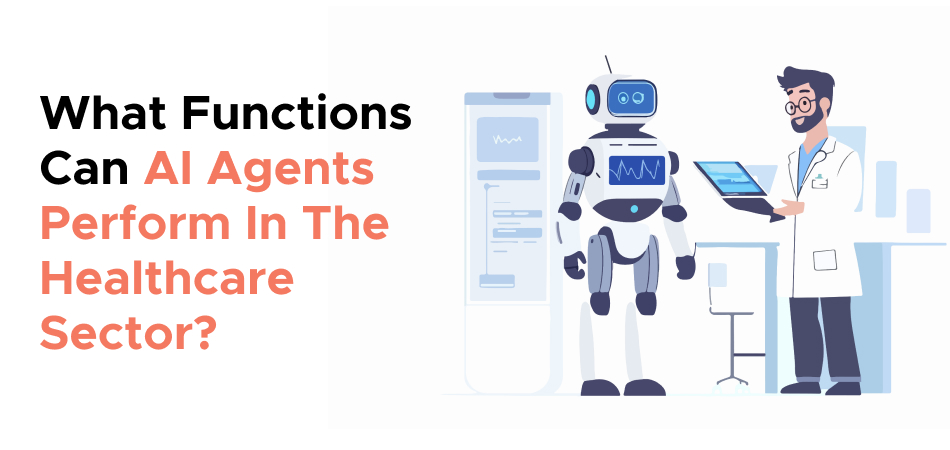
Key Elements of AI Agents for Healthcare
Machine-based healthcare agents across medical practice are revolutionizing healthcare by providing automation solutions, streamlining diagnosis and treatment, and increasing patient interaction. The proficiency of these intelligent agents depends on several components for their successful working in healthcare organizations.
1. Machine Learning Algorithms
Machine learning (ML) is the chief component of most AI-driven attributes of the healthcare environment. AI algorithms allow the systems to automatically mine large datasets, identify patterns, and predict other aspects. For instance, ML algorithms can accurately recognize X-rays, MRI, or CT scans in diagnostic imaging and identify pathological features like tumors or fractures. An AI app development company can help create these advanced machine learning models to improve diagnostic accuracy and support better healthcare outcomes.
As healthcare AI agents learn through exposure to new data, the ML characteristic helps agents to be more accurate in diagnosing and prescriptive treatment as they encounter new data. High-end machine learning application developers who create apps that use AI in health software in Australia make clinic applications even better with use; therefore, they can quickly adapt to the Australian health context.
2. NLP
In specific words, natural language processing makes AI agents understandable and an interpreter of Human language. NLP within health care aids virtual assistants, chatbots, and voice recognition systems for patients and medical staff. For example, deep language understanding can be applied to AI agents to help patients find the necessary information about symptoms and recipes, schedule appointments, and many others.
NLP helps them translate what would otherwise be unstructured text from medical records into actual data. It is also used to assist in better documentation, which is more accurate and less time-consuming. AI application development services incorporate NLP to enhance AI agents’ ability to engage patients and healthcare workers to improve the general healthcare system.
3. Data Integration and Interoperability
The effective operation and efficiency of healthcare AI agents depend very much on data integration and compatibility. AI systems must analyze data in contexts such as electronic health records (EHR), biomedical sensors, and imaging. Such integration and data analysis capabilities allow AI agents to make correct conclusions and predictions, diagnose a patient’s condition, and prescribe adequate therapy. An AI app development company can assist in creating robust systems that ensure seamless data integration for optimal AI performance in healthcare.
One advantage of interoperability is that it enables AI agents to be compatible with various healthcare platforms and easily share information with multiple departments and systems in healthcare institutions. AI application companies in Australia are centered on developing applications that integrate data and the structural compatibility of AI agents.
4. Predictive Analytics
Another aspect of healthcare AI agents is Predictive analytics. AI agents are uniquely positioned to use patient data and predict future health risks, such as the prevalence of diseases or susceptibility to complications. Such predictions enable early healthcare interferences, resulting in a preventive care measure that restores health.
AI agents also help with resource management, allowing healthcare facilities to efficiently meet patients’ needs and the proper treatment protocols. Healthcare mobile application development services provide users with analytics capabilities that can anticipate patients’ demands and decrease the chances of expensive complications at the company.
5. Usability and Patient Portal or Patient Centredness
AI agents with a good user interface can only work effectively in the healthcare system. Whether it’s an aviator for a virtual assistant, a triage tool, or any other predictive analytics application, the front end MUST reflect simplicity and be easy to understand for the ordinary non-specialist patient and the complex medical practitioner.
Patient engagement involves a paradigm shift through which AI systems provide meaningful and tangible information that patients can apply in their care. When integrating AI solutions with applications’ easy interfaces, AI app development companies in Australia guarantee that healthcare agents can control more effective patient experiences and outcomes.
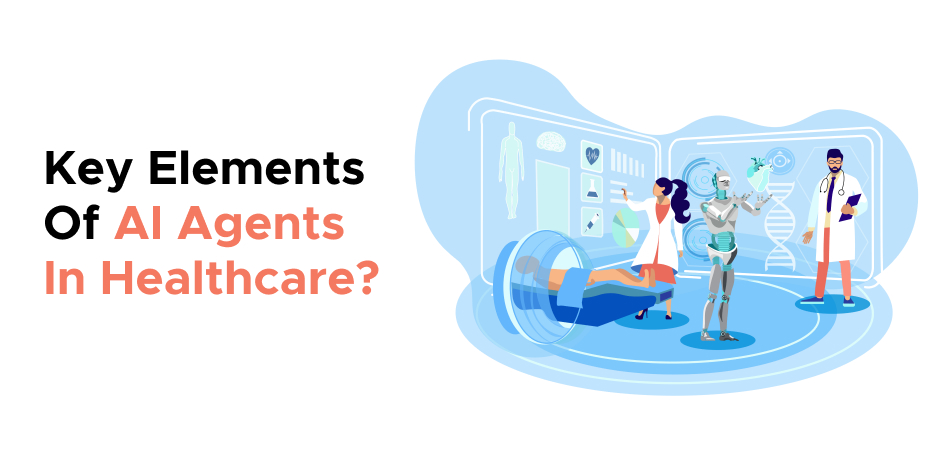
Top 15 AI Agents in Healthcare
Artificial intelligence (AI) has made possible healthcare robotics, augmented medical interactions, and diagnostic assistance. Current ML, NLP, and data analytics platforms support healthcare AI agents to perform different tasks. The following is a list of fifteen major application areas of AI agents in healthcare that contribute to the revolution and enhancement of healthcare services.
1. Medical Imaging Analysis
AI also diagnoses diseases using images, including X-rays, MRI, and CT scans. Regarding the efficiency of recognizing various diseases, AI systems show high results. They can identify a tumor, a fracture, an infection, etc. These systems help radiologists develop another view, diminish a human factor’s impact, and enhance the time for diagnosing the problem.
2. Clinical Decision Support
AI agents scan patients’ records, such as medical history, lab tests, and other related data, to help other healthcare personnel make decisions. These decision support systems help determine the likely diseases or recommend managing a particular case, thus enhancing efficiency and speed in service delivery.
3. Disease Prevention through Predictive Analytics
Predictive analytics in AI can help determine diabetic, cardio, or even cancer-prone patients based on records. The use of AI to predict early one’s health risks means that the required treatments can be administered before the risk results in a health issue; this makes treatment more effective and decreases costs.
4. Personalized Medicine
They explained that by assimilating a patient’s genetic, environmental, and lifestyle information, an AI agent could devise treatment plans unique to each patient. This approach is likely practical because it provides tailored treatment to patients based on their features, disregarding those features.
5. Virtual Health Assistants
Artificial intelligence-enabled bots and virtual assistants handle self-scheduling, triage, essential patient communication, health questions, and drug queries. These AI agents perform the paraprofessional function of answering questions in real-time, letting healthcare providers attend to higher priorities. An AI app development company in Australia can help design and implement these AI-driven solutions to streamline operations and enhance patient care in healthcare settings.
6. Chronic Disease Tele Monitoring
Smart garments with specialized artificial intelligence agents ensure healthcare professionals stay connected with patients with chronic diseases such as diabetes, hypertension, and asthma. Prolonged data collection and AI processing can help identify early signs that require intervention.
7. Drugs Discovery and Development
AI programs are changing the culture of the pharmaceutical industry by enhancing the speed of drug discovery. Applying big data analysis to vast amounts of medical journals and patient data, AI makes it possible to select promising drug compounds or predict the effectiveness of the planned tests and trial outcomes, significantly reducing the time it takes to bring new drugs to the market.
8. Clinical Trial Optimization
AI can help clinical trials by selecting appropriate cases based on their doctors’ notes and genomic profiles. Other beneficial uses of AI include tracking patient responses, thus making clinical trials safe and efficient.
9. NLP for EHR
Such information is obtained from the raw data through techniques like NLP, which uses advanced artificial intelligence to parse data from unstructured sources such as EHRs. Thus, NLP maximizes decision-making based on clinical notes and patient histories while minimizing documentation done by hand.
10. AI-Based Robotic Surgery
Technological tools are AI-controlled and implanted into robotic surgical platforms to make surgery more selective and less invasive. Today’s AI systems can process patients’ information in real-time during operations, advising the surgeon and performing complicated movements.
11. Integrated Computerized Billing and Claims
Taken as a collective whole, AI agent applications can include critical administrative tasks such as billing and claims processing. Those systems minimize human errors, hasten the reimbursement process, and make compliance with health care lawful, decreasing administrative costs and making the operational cycle.
12. Telemedicine and Virtual Consultations
Telemedicine service offerings through artificial intelligence systems involve consultations between familiar end-users and healthcare professionals. These systems can handle patients’ symptoms, make preliminary diagnoses, suggest treatment, and enhance access to health care in areas where qualified personnel are scarce.
13. Voice Recognition in Documentation
Siri, Alexa, and other voice recognition AI agents are being developed to automatically transcribe the flow of conversation between the doctor and the patient and ensure proper documentation of the client’s case. This saves a lot of time that people could have spent writing notes that could otherwise be spent attending to their patients.
14. AI-Powered Drug Interaction Detection
The agents can search for a patient’s past prescription history and determine if two drugs prescribed will interact with each other, compounding any medical complications that the patient may be experiencing. Thus, AI systems can also identify these early interactions, which will help avoid many cases of unfavorable drug reactions and guarantee patient security.
15. Population Health Management
In population health management, AI agents extract trends from large datasets to determine risk within the population. Such information assists healthcare organizations in properly distributing some of their resources whenever they design and implement specific public health intervention strategies.
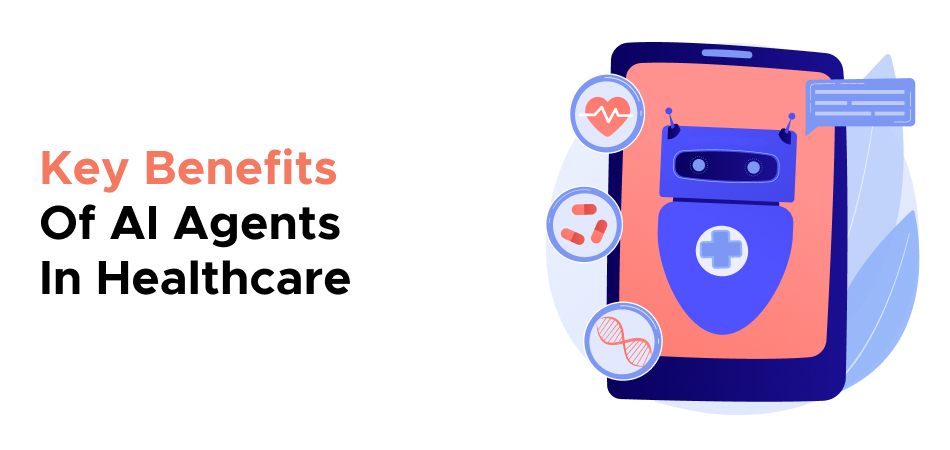
Crucial Benefits of AI Agents for Healthcare
Intelligent agents are revolutionizing this sector by delivering efficient patient care from the clinical or administrative perspective. These innovative systems, dependent on machine learning, data mining, and natural language processing, are incredibly advantageous for care deliverers, consumers, and enterprises. Here are the key benefits that I found necessary as a result of the use of AI agents in healthcare:
1. Improved Diagnostic Accuracy
Medical theorists can use patient records, such as history, tests, and imaging results, to help healthcare providers make accurate diagnoses. AI agents can review large volumes of information and are very effective in identifying patterns and deviations that may escape the eyes of medical practitioners.
For instance, AI applications in the early phase of diagnosing specific diseases like cancer, heart ailments, and neurological disorders trigger preventive measures that significantly enhance results. This is because several conditions may present similar symptoms; correctly identifying the disease will aid in early treatment.
2. Personalized Treatment Plans
A fundamental concept that AI agents implement is the possibility of suggesting particular treatments to individual patients. Using an individual’s genotype, phenotype, and medical history, AI can recommend appropriate treatment regimens for a patient.
It not only improves the effectiveness of the treatment but also prevents possible unwanted side effects that the treatment process may cause because all the treatments are aimed at the patient’s characteristics. This way, AI shifts the emphasis from the principal standard treatment plan, enabling doctors to provide patients with more personalized care.
3. Enhanced Patient Engagement
AI agents like DH virtual health assistants can engage patients by demonstrating an ability to answer common queries, give health tips, and even schedule appointments. They constantly remind patients what is being done to them and what they should be doing to their bodies.
Automated conversational agents also simulate psychotherapists, allowing patients to better control their health. Regarding the AIMT concept, analytical technology increases patient satisfaction and better outcomes by utilizing digital communication and granting patients access to healthcare information.
4. Operational Efficiency and Cost Reduction
Organizations’ goals and missions would handle all these administrative roles, freeing up human professionals in the healthcare industry to attend to essential activities. By reducing their workload, healthcare staff could spend more time attending to their patients’ needs.
Moreover, AI-based forecasts and predictions can avoid resource wastage, preparing the health sector to serve the people. This helps cut down operational expenses and improve general operations’ productivity.
5. Accelerated Drug Research and Development
Artificial intelligence is being adopted in the drug discovery and development cycle to screen through big databases in search of prospective drugs that may have a positive test case. AI agents can help pharmaceutical companies shorten the research duration to deliver new medications to the market. AI agents contribute to the efficient configuration of clinical trials, the choice of more appropriate patients, and follow-up on their reactions; this increases the possibilities of success and its success rate in managing costs. An AI app development company can assist pharmaceutical companies in integrating AI solutions to optimize drug discovery and clinical trial processes.
6. Increased Patient Populace Management
AI agents can manage the population health of delivering institutions by analyzing big data and risk profiles to make accurate predictions. By predicting tendencies across sections of the population, artificial intelligence can make an approximate prognosis for possible epidemics, manage chronic diseases, and support the development of specific health prevention and control measures. This is beneficial to the community and valuable for managing human resources and supporting needy healthcare givers.
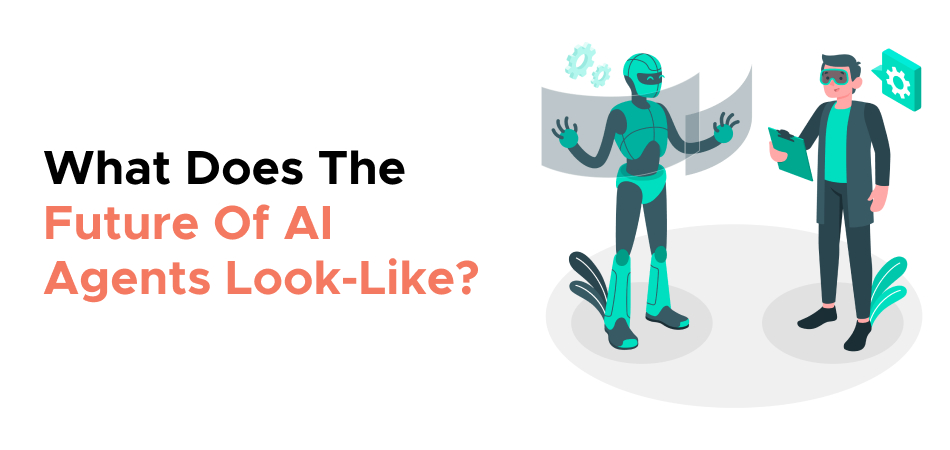
Future Trends for Generative AI Agents in Healthcare
The potential of generative AI agents in healthcare may only be seen in new and different forms as the establishment continues to evolve toward benefiting from generative AI agents to go beyond narrow applications and create more efficient and creative solutions to healthcare problems. An AI app development company can play a crucial role in developing these advanced AI-driven solutions for the healthcare industry.
These systems, which consist of intelligent systems able to create new data and content from input data, are expected to bring further development and innovation in patient treatment, drug discovery, and healthcare system functioning. Here are the following healthcare trends for generative AI agents in the future.
1. Personalized Medicine Optimized
Generative AI agents will be critical in moving to the next level of personalized medicine. Generative AI can use patient data, including genetics, environment, and lifestyle, and build a model of the patient’s response to therapies. This trend will also make treatments more effective with fewer side effects since AI agents will create a plan of action regarding a particular treatment based on the characteristics of the person to be treated.
2. Introduction to Artificial Intelligence in Drug Development
The key innovation that generative AI holds for the future of drug development is a shift. AI agents can also anticipate how molecules affect the human body and develop new drugs and treatment plans more effectively. These AI systems will also create new drug compounds; the drug discovery process will be sped up, and costs will be less expensive. By partnering with an AI app developing company in Australia, pharmaceutical companies can use artificial intelligence to generate, develop, and test drugs in the marketplace more often than they used to in the past.
3. Artificial Intelligence Clinical Documentation
The Clinical Documentation 360° Report outlines how generative AI agents are becoming the key to transforming clinical documentation. From observations made during an interaction with a patient, AI can create detailed and complete records of a patient’s state without requiring much effort and time from the healthcare worker. This technology will increase productivity, decrease clinical mistakes, and help doctors pay more attention to their patients. An AI app development company can assist in developing and implementing these AI-driven solutions to streamline clinical documentation processes.
4. “Virtual Health Assistants and Support Systems”
In the future, generative AI agents are expected to become even brighter digital VAs that can offer patients time-sensitive, first-of-its-kind, and personal support. They will perform a broader work scope, providing counseling and mental support and delivering individualized health advice so patients can manage their health.
5. Enterprise Health Management
Applying generative AI will improve the advanced form of models used in healthcare. Through role-playing ranging from disease advancement to patient response to treatments, AI agents shall enable healthcare to act proactively to make appropriate decisions that could have been nearly impossible. These models can predict the health requirements of communities, subsequently assign resources, and control possible medical emergencies that would ensue.
Conclusion
The healthcare sector is increasingly benefiting from the new artificial intelligence technology. It benefits telemonitoring, individual approaches to treatment, and improvement in the speed and accuracy of decision-making processes. As seen from the above discussions, these sophisticated technologies enhance the quality of patients’ care and clinical productivity; however, advancing these systems needs the right strategic plans and strictly moral values.
Here at our AI app development company inAustralia, we mainly develop AI agents made with the healthcare industry in mind. Due to the core values and strict regulations in healthcare systems worldwide, we put ethics, privacy, and transparency into our developed systems powered by AI technologies. By implementing core professional values of the organization, such as justice and data protection, we can elevate the patient experience and forge a more secure environment in health care.
The use of AI agents in healthcare is auspicious in the future. AI models will grow as humankind progresses and offer an early diagnosis of possible health issues or conditions. The increasing development of innovative AI systems that can understand the user’s intention and process complex command signals will dramatically transform the healthcare industry.
A recent knowledge in the healthcare industry is independent care delivery, which can be achieved through collaboration with an AI app development company in Australia and services for AI app development. Connect with our team at 7 Pillars today to help you navigate AI agents available in the market.








